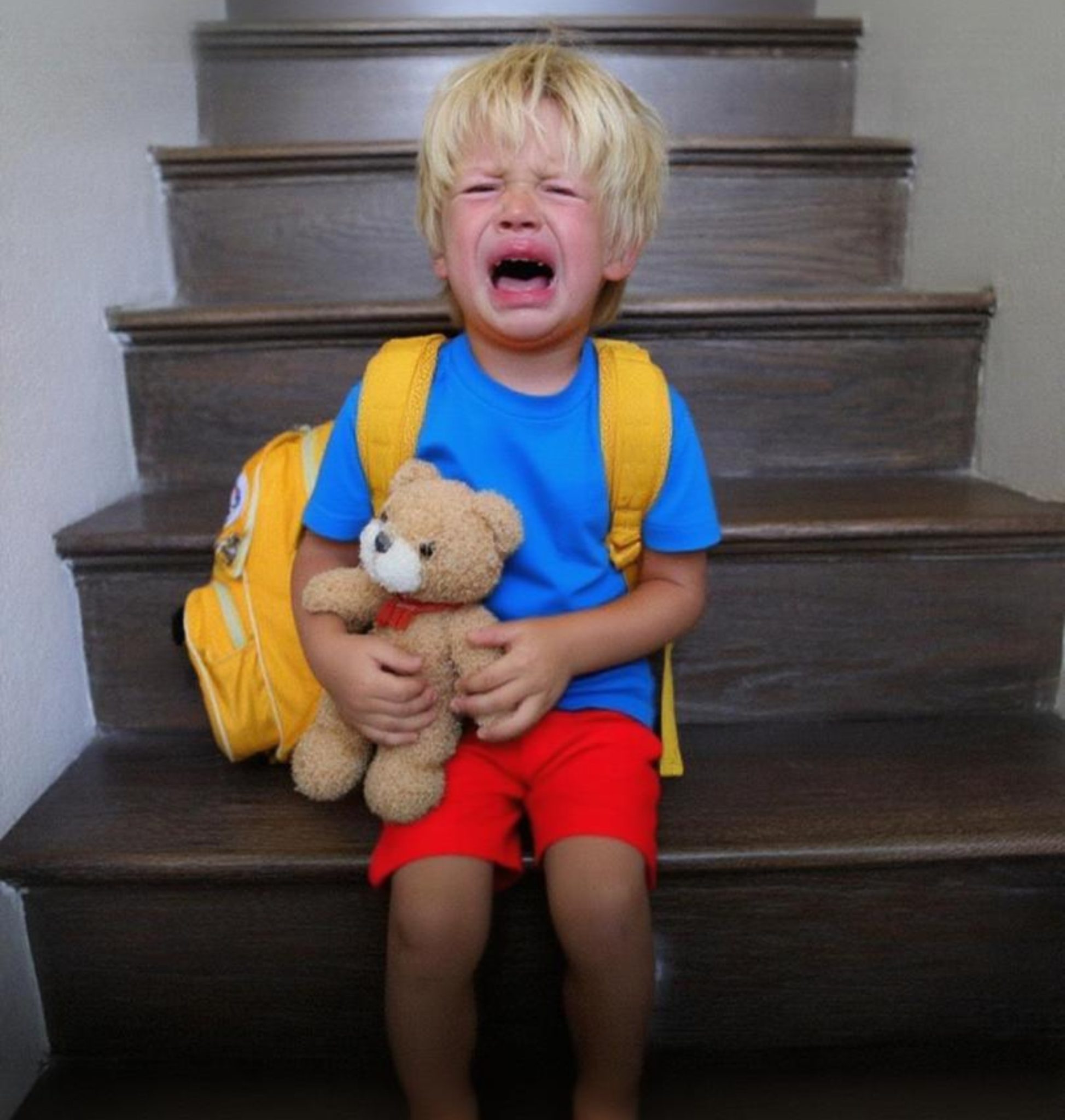Johnny, my 3-year-old, used to wake up excited about daycare every day. He’d hum little tunes, sneak his favorite toys into his backpack, and sprint down the stairs yelling, “Let’s go, Mommy!” — practically pulling me out the door.
For him, every morning was a new adventure.
Honestly, a small part of me felt a bit envious that my son was eager to leave and spend time with others. But I never held it against him — I was glad he had a safe, welcoming place he loved.
Then one Monday morning, everything suddenly shifted.
While I was making coffee, I heard a scream — a piercing, heart-stopping scream. I dropped my cup, shattered it on the floor, and ran upstairs as fast as I could.
There was Johnny, curled up in a corner of his room, clutching his blanket tightly, face flushed and drenched with tears. My heart raced as I knelt beside him.
“What’s wrong, sweetheart? Are you hurt? We need to get ready for daycare,” I said gently.
He looked at me with wide, terrified eyes and pleaded, “No, Mommy, no! Don’t make me go!”
Confused, I asked, “Go where?”
“Daycare!” he sobbed, clinging to my legs. “Please, don’t make me!”
I hugged him, trying to calm him with soft words, thinking maybe he had a nightmare or was just overtired. “Kids have moods, right?” I reassured myself.
But it wasn’t just that day.
The next morning, he refused to get out of bed.
Every time I mentioned daycare, his lip quivered. By midweek, he was begging through tears not to go. Each morning brought panic, shaking, and desperate pleading.
By Thursday night, exhausted and worried, I called our pediatrician, Dr. Adams.
She reassured me, “This is typical. Separation anxiety peaks around this age.”
But I told her, “It doesn’t feel normal. This is fear. Real fear.”
She hesitated, likely thinking I was overreacting. “Keep an eye on it. He might just be going through a phase.”
I wanted to believe that.
Then Friday arrived. I was running late for work, and Johnny was crying again. I lost my temper.
“Stop it!” I shouted. “You have to go to daycare!”
His reaction froze me. He stopped crying but didn’t move — his eyes wide with terror.
Dropping to my knees, I finally realized Johnny wasn’t being stubborn — he was scared. “I’m sorry,” I whispered, hugging him.
“Why don’t you want to go to daycare anymore?” I asked.
After a pause, he quietly whispered, “No lunch. Please, Mommy… no lunch.”
I was stunned. What did lunch have to do with this?
I kept him home the next day. Thankfully, Kenny, our neighbor’s teenage son, babysat, and Johnny loved spending time with him.
On Saturday morning, I had work to catch up on. The daycare was open, so I tried a different approach.
“I’ll pick you up before lunch today,” I promised. “You won’t have to stay for lunch. Okay?”
He hesitated but nodded. For the first time that week, he allowed me to buckle him into his car seat without tears.
At drop-off, though, he clung to my hand, eyes full of fear, until the last moment. Leaving felt like breaking his heart.
I couldn’t focus at work, so at 11:30 a.m., I left and drove to the daycare.
Parents weren’t allowed inside during mealtime, but the dining room had glass walls. I circled the building and peeked in.
What I saw chilled me.
Johnny sat at the end of a long table, head bowed. Next to him was an older woman I didn’t know — gray hair in a tight bun, no badge.
Her face was stern, even harsh.
She grabbed Johnny’s spoon and pushed it toward his lips hard.
He turned his head away, crying silently, tears falling, but she kept forcing him.
“You’re not leaving until you finish your plate,” she snapped.
I burst through the door, startling staff.
“Ma’am, you can’t be here—”
“I don’t care!” I said, heart pounding.
Johnny’s relief was immediate as I wrapped him in my arms.
“If you force my child to eat again, I’ll report this,” I warned the woman.
“It’s policy,” she said coldly. “Kids must eat what’s served.”
“Policy? Forcing children to eat until they cry is abuse!” I said, furious.
She was silent.
I asked the staff, “Who is she? Where’s her badge?”

No one answered.
I took Johnny and left.
That night, I sat by his bed.
“Why don’t you want to eat at daycare?” I asked softly.
He curled up and whispered, “She says I’m bad if I don’t finish. She tells the kids I waste food. They laugh.”
His voice broke.
It hit me — he wasn’t afraid of food. He was scared of being humiliated. The woman had turned meals into punishment.
By Monday, I worked from home with Johnny and called the daycare director, Brenda.
“We don’t force kids to eat,” she said quickly.
“I saw her shove his spoon into his mouth. He cried,” I said.
“That’s not staff,” Brenda said quietly. “She’s a volunteer.”
I pressed, “A volunteer with no background check, disciplining my son?”
“She’s my aunt,” Brenda admitted. “Retired, helps sometimes.”
I demanded, “No volunteers alone with children. Show me your volunteer policy. I want confirmation she won’t be near my son again.”
She was silent.
I couldn’t sleep, haunted by Johnny’s fearful face and his whispered “No lunch.”
I reported the incident to the state licensing board.
Others had complained too—about neglect and understaffing.
An inspection followed.
The daycare was over capacity. Many staff weren’t certified. Volunteers like her were unsupervised and untrained. Several kids admitted being forced to eat even when sick or full.
It wasn’t just Johnny.
The state warned: fix it or shut down.
Brenda called, angry.
“Why didn’t you come to me first?”
“I did,” I said. “You protected her.”
No reply.
Later, I met another mom whose daughter also suffered. She thanked me for giving her courage to speak up.
That daycare lost its license.
We found a new place — with trained staff, respect, and kindness.
Johnny runs in every morning, smiling and confident.
The teachers respect each child’s needs, asking questions and never forcing food.
On his first day, a teacher knelt down and said, “Eat as much or as little as you want.”
Johnny smiled a real smile.
Now mornings are joyful again.
And I learned this: always listen to your child, even if the concern seems small.
Sometimes, their quiet voice is the only warning you’ll get.
Johnny’s words still echo:
“No lunch, Mommy.”
They were simple but changed everything.




